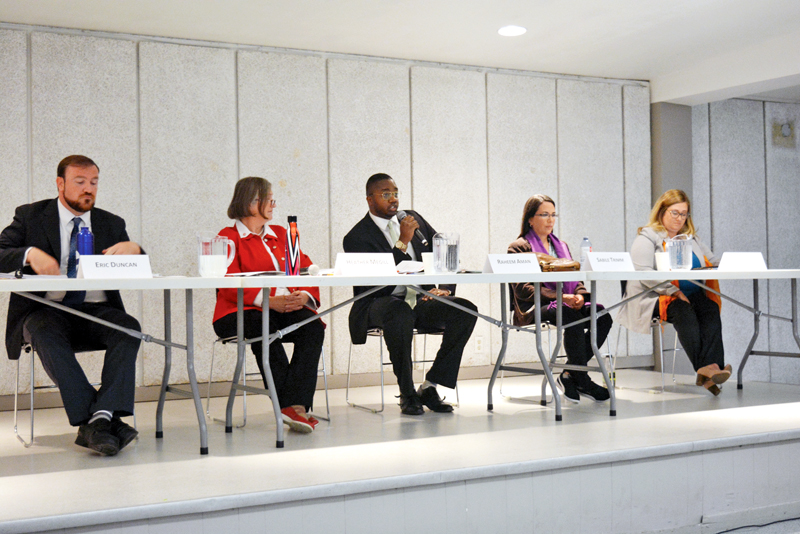SDSG candidates debate as election date approaches
On Thurs., Oct. 10, the SDSG candidates for the upcoming federal election met at the Joel Steele Community Centre in Winchester to debate trade agreements, balancing the budget and childcare as well as other national issues. Pictured from the left, Conservative candidate Eric Duncan, Liberal candidate Heather Megill, Green Party candidate Raheem Aman, People’s Party candidate Sabile Trimm and New Democratic Party candidate Kelsey Catherine Schmitz. Glover photo
WINCHESTER – As the opening statements ended at Winchester’s All Candidate Federal Debate, Conservative candidate Eric Duncan and Liberal candidate Heather Megill were immediately asked by the Dundas Federation of Agriculture to comment on the current trade issues and compensating farmers for lost marketing opportunities.
Megill first commented that, regardless of the United States’ stance on removing supply chain management, the Liberals want to keep them in check. “We’ve recently had to go head-to-head with the Americans over NAFTA; we know that the Americans want us to totally destroy our supply chain managements. Canada made it very clear, in those negotiations, that we want to keep them,” she said. “As Liberals, we understand what it’s like to take on big risks and, at the same time we had dramatic cuts from Stephen Harper as far as business risk management programs, we understand how farmers are dealing with that. The Liberal party is absolutely behind our farm sector and will work hard in any negotiations with any countries, we’ll be going up against the EU and Britain certainly looking at things if they leave [with] Brexit.”
Duncan mentioned that, in the last four years, there has not been a lot seen in timely compensation in terms of the trade deals, targeting both Comprehensive Economic and Trade Agreement (CETA) and the changes to the North American Free Trade Agreement (NAFTA). He also touched on the Prime Minister’s “embarrassing” slip ups impacting our current trade agreements.
“Respectfully in the last four years, we have not seen much timely compensation in terms of the impact of some of these trade deals. A perfect example is CETA and some of the other changes that are coming up to the NAFTA 2.0 agreement; a couple weeks before the election, after years of agreements being put into place, the minister came out in support for the dairy industry for impacts of supply management,” he said. “Two issues, they were years late with what they should’ve been and they were only one year in length; that does not provide stability in the industry to get what we need to do. What we need to do is keep going out and having strong leadership on the world stage and, frankly, I think in the last four years, a line I like to use is, ‘maturity matters.’ We all remember the trip that the Prime Minister took to India and the embarrassment it caused on the world stage, and it was [an embarrassment] and it impacted our relationship, our ability to trade there and that’s been replicated in a different form in China as well.”
The Chamber of Commerce, worried about the lowered career opportunities in SDSG, asked Megill and NDP candidate Kelsey Catherine Schmitz about their plan to get the government out of the way of entrepreneurs, so that businesses can create more jobs in the riding.
Megill stated that more money needs to be poured in entrepreneurship, asking business owners to come forward with their ideas so that the Liberal government can help them grow their businesses.
“We’re going to be developing, asking for people to come forward and then when they have those great ideas, we’re going to help them grow their business and market these great innovations around the world. That’s something that is really important,” she said. “You probably all know that we had a small business tax cut, it was up at nine and now it’s down to seven per cent, that’s quite a drop. We want to encourage entrepreneurs in this country because we know that small business is the driving force behind our country.”
Schmitz, citing a personal story involving her friend’s daughter’s tribulations of one day adopting the family farm, stated that she wants to ensure that entrepreneurs are supported; stressing the importance of finding ways to work cooperatively with farmers to ensure that the way that the NDP is investing feels appropriate, allowing businesses to grow.
“I went to a friend’s dairy farm last night, went out to the barn with her husband and we were talking about her daughter’s interest in inheriting the farm. We were talking about how difficult it could be for her if she ever decided that she wanted to grow from what the family currently had access to and the kind of regulations that are existing,” she said. “I reflected about our party’s regulations when it comes to supporting entrepreneurs and small businesses and reviewed the idea that we’re going to be supporting small businesses and small new farmers by providing low interest loans and supporting people that way.”
In the light of the social service cuts by the Conservative government, especially on the provincial level, Schmitz and Green Party candidate Raheem Aman were asked what they would do to help lower and middle-class families with childcare and simply living day-to-day lives.
Schmitz started by commenting on the affordability of the social services and that the root cause is not being addressed; wages are not rising as high as the cost of living inflation. According to Schmitz, support across the field is required and that’s why the NDP party is investing in universal childcare.
“Affordability and the things like medication are outrageous when it comes to cost; we need better support across the field when it comes to affordable housing, access to good pharmacare, access to dental,” she said. “We also need to make sure people are able to return to the economy and their jobs, create jobs by ensuring that their children have adequate childcare, so we’re investing in universal childcare. The reason why we’re doing this is because we believe that there are priorities and a way we can spend our money more effectively and take better care of individual people, their families and aging seniors as they are putting more strain on the healthcare system.”
Aman continued in agreement of his running mate, stating that the services are simply not affordable right now. He made a point to mention that Canada is one of the only western developed countries that has universal healthcare but doesn’t include pharmacare and a stance needs to be taken in order to change this.
He also mentioned that the element of environment is still there and the government will want to move toward a green economy.
“We want to be able to make life more affordable for everyone, we have to remember the element of the environment and how we’re going to have to shift to a green economy,” he said. “Over time, this is something our government is going to want to take action on; so, we’re going to want to introduce a guaranteed little income to those who are falling between the cracks.”
A major question that was asked of Duncan and People’s Party of Canada candidate Sabile Trimm involved the plank of their platforms that involve balancing the budget, each giving a different accomplishment time frame.
Trimm, whose party claims that the budget can be balanced in a matter of two years, states that many measures will be taken into place to save the country billions of dollars. She also mentioned that this needs to happen in two years because of, in her words, the pending recession that we’re not prepared to tackle.
“There are many ways we are going to balance the budget, we’re going to stop Foreign Aid unless it’s for emergencies. We’re going to pull out of the Paris Climate Agreement because it is not effective, that’ll save us a few billion dollars, and we’re going to cut corporate welfare; several billion dollars there as well,” she said. “There are many measures we’re going to take, it’s going to be tough, but the truth is that we survived the 2008 recession because we went into it in good shape; there was a surplus thanks to Paul Martin. But now, the interest rates were low and the economy was growing, that was a good time to pay off debt and put ourselves in a good situation for the next recession which there are already signs that it’s coming and coming close.”
Duncan, whose party claims that the budget can be balanced in five years, rebutted Trimm’s answer stating that, during the time of Jean Chretien and Paul Martin, the budget was balanced due to severe cuts to dire services and the People’s Party of Canada’s will do that same.
“Sabile mentioned in her opening that the last time it was done in a shorter time frame with Jean Chretien and Paul Martin back in the ’90s and she mentions that it’s going to be tough; it would be and here’s why,” he said. “They balanced the budget by cutting health and social transfers to the province. We’re in a demographic right now that if we were to make any cuts to our health and social transfers, it would be crippling. We have an aging demographic and I don’t think anybody will disagree that there is already a strain in our healthcare system and as our population ages, we need more long-term care and our hospitals are going to be getting busier. You can balance the budget in two years, don’t get me wrong but it’ll be on the backs on important programs like that.”
Be sure to cast your vote on election day Mon., Oct. 21.
Reporter/Photographer for Chesterville Record and Eastern Ontario Agrinews. Currently working on Record segment, “Chilling Tales from Beyond”











